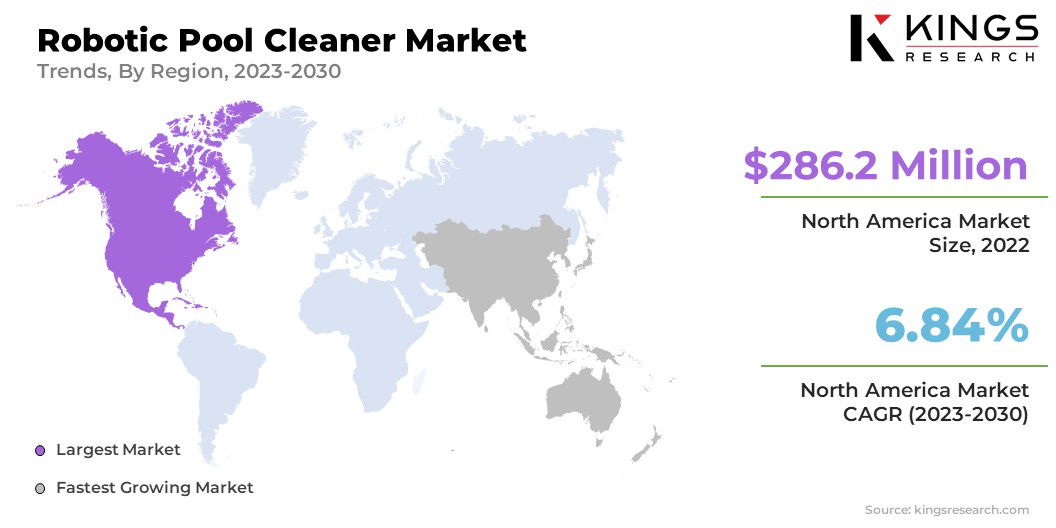
Robotic Pool Cleaner Market

Robotic Pool Cleaner Market Size, Share, Growth & Industry Analysis, By Type (In Ground, Above Ground), By End User (Residential, Commercial), By Distribution Channel (Specialty Electronics Stores, Direct Sales, Departmental Stores, Online Retailers, Others) and Regional Analysis, 2023-2030
Pages : 120
Base Year : 2022
Release : October 2023
Report ID: KR286
Robotic Pool Cleaner Market Size
The global Robotic Pool Cleaner Market size was valued at USD 762.91 million in 2022 and is projected to reach USD 1,255.20 million by 2030, growing at a CAGR of 6.57% from 2023 to 2030. In the scope of work, the report includes products offered by companies such as Hayward, Maytronics Limited, Pentair, Polaris, Pool Corporation , iRobot Corporation, Smorobot, Aiper, Ofuzzi, ZODIAC and Others.
The advancement in the construction of automated pool cleaning devices equipped with highly efficient suction technology to effectively eliminate particles, algae, and scale from pool water and scrub the pool walls has greatly improved the overall cleanliness and smoothness of pool surfaces. In recent years, robotic pool cleaners have gained popularity since they offer a more comfortable and environmentally friendly level of pool maintenance. The integration of sensors and manipulation structures allows robotic pool cleaners to operate independently.
Pool cleaning robots are now equipped with integrated timers and scheduling structures that allow customers to program pool leveling on unique occasions or a daily schedule, providing a more hands-on cleaning experience. In the past few years, the housing industry has experienced an explosive boom, and the construction of motels on an international scale is estimated to have a significant impact on the global market.
The factors restraining the growth of the robotic pool cleaner market include high costs, technical limitations, competition, and regulatory and ethical issues. The gadgets' high cost may limit their adoption, particularly in small enterprises. Technical constraints can prevent them from being employed in specific applications. Considering effective development and deployment, it is vital to take into account the ethical and legal concerns associated with using devices. These factors have a significant impact on the overall market share.
Analyst’s Review
The increasing awareness of the advantages of using pool robots over traditional manual cleaning methods has led to a rise in demand for these cleaners in the residential sector. Manufacturers are employing recent advances in technology to cater to the growing consumer demand for environmentally friendly products, which has led to an expansion in the utilization of these robots. The rise in the number of high-earning people participating in leisure activities such as swimming has contributed to the growth of the robotic pool cleaner market.
Numerous advantages of robot pool purifiers, such as cost-effectiveness, ease of use, and high scrubbing energy, are accelerating market growth. Rapid technological advances in the design and operation of robotic pool cleaners are expected to drive their adoption worldwide.
Market Definition
A robotic pool cleaner is an automated tool designed to level pools by independently moving across the pool and performing visible cleaning tasks. A robotic pool cleaner is a microdevice that cleans dirt, algae, and small particles from the pool using its own detergent and energy. This computerized pool cleaner is considered ideal for cleaning in-ground pools, despite the fact that several different varieties can also smooth the floor of an in-ground pool.
Pool cleaning robots use low-voltage, energy-efficient motors to operate without using extra energy, which can climb and scrub pool sections and clean hard-to-reach places. Many robotic pools can handle large particles, so they are best suited for pools with overhanging bushes or different types of vegetation. Pool cleaning robots include remote controls that allow owners to easily manipulate cleaning methods and direct the robot to specific areas.
These pool cleaning robots allow owners to set a cleaning schedule so that the robot cleans the pool regularly at predetermined times, reducing the need for manual intervention.
Market Dynamics
The robotic pool cleaner market growth on a global scale is expected to expand due to the rise in the number of water parks being established worldwide. With water parks attracting a significant influx of visitors, the pools often face issues regarding the buildup of dirt, waste, and various undesirable items. The expanding number of swimming pools in homes and apartments can be considered a reflection of the growing demand for luxurious features and high-end amenities in robotic pool cleaners. The growing demand for robotic pool cleaners is projected to increase with the surging popularity of outdoor recreation and exercise activities and the rising need for swimming pools.
Pool cleaning robots have become increasingly popular in recent years due to their convenience, efficiency, and effectiveness. However, there are also some challenges associated with the use of these devices, especially regarding technology and maintenance. These devices rely on advanced sensors, motors, and cleaning mechanisms to effectively remove dirt, debris, and algae from the pool. In addition, software and programming must be constantly updated and improved to ensure optimal performance and efficiency.
In addition to this, these devices require regular cleaning, maintenance, and repair to ensure their long-term efficient operation. The battery and charging system must be regularly maintained and replaced if necessary. Additionally, maintenance and repair costs can add up over time, making these devices a significant investment of time and money.
Segmentation Analysis
The global market is segmented based on type, end-use, distribution channel, and geography.
By Type
Based on type, the market is bifurcated into in-ground pool cleaners and above-ground pool cleaners. The in-ground segment dominated the industry with a revenue of USD 482.77 million in 2022 owing to the growing use of these cleaners, which are designed to make pool maintenance easier and more efficient, allowing pool owners to spend more time relaxing and less time cleaning their pool. Some in-ground robotic pool cleaners can also be controlled remotely or via a smartphone app, which makes them even more user-friendly.
By End User
Based on end user, the robotic pool cleaner market is segmented into residential and commercial. The commercial segment is projected to have the highest growth rate, with a CAGR of 6.16% during the forecast period. This can be attributed to the growing interest in travel and leisure activities, resulting in a higher demand for commercial properties that offer swimming pools as a prominent amenity.
By Distribution Channel
Based on distribution channel, the robotic pool cleaner market is classified into specialty electronic stores, direct sales, departmental stores, online retailers, and others. The direct sales segment dominated the market with a revenue of USD 363.52 million in 2022 and is likely to observe a sizable expansion in the coming years owing to the increasing product availability of pool-related products and equipment in specialty electronic stores.
Robotic pool cleaners may also be sold in these types of stores, which are expected to have the most comprehensive selection of robotic pool cleaner products and services.
Robotic Pool Cleaner Market Regional Analysis
Based on regional analysis, the global market is classified into North America, Europe, Asia Pacific, MEA, and Latin America.

The North America Robotic Pool Cleaner Market share stood around 37.51% in 2022 in the global market, with a valuation of USD 286.2 million, owing to increasing concerns among pool owners about cleanliness and hygiene. The rising cost of heavy labor in the region, particularly in the U.S. and Canada, has bolstered the demand for robotic pool cleaning systems.
These robots are programmed to soften the water's surface, which reduces the cost of cleaning. As the state tourism industry in the United States progresses, more residential and commercial pools are being constructed. The population of the United States is growing increasingly conscious of the benefits of swimming instruction, which contributes to the construction of new pools and supports the growth of the robotic pool cleaner industry.
Europe is the fastest-growing region, with a market value of USD 202.17 million in 2022. Robotic pool cleaners are becoming increasingly popular among pool owners in Europe due to their efficiency and ease of use. They are designed to clean the entire pool, including walls and floors, without human intervention.
The wide availability of market vendors across the region provides a wide variety of cleaners with multi-layer filtration and intelligent navigation, which ensure thorough and efficient cleaning of the pool. Many of the new devices are available with low-voltage vehicles and larger green energy control structures to help reduce electrical netting and extend the life of the scrubber, which propels overall market growth across the region.
Competitive Landscape
The robotic pool cleaner market report will provide valuable insights, with an emphasis on the fragmented nature of the industry. Prominent players are focusing on several key business strategies, such as partnerships, mergers & acquisitions, product innovations, and joint ventures, to expand their product portfolio and increase their respective market shares across different regions.
List of Key Companies in Robotic Pool Cleaner Market
- Hayward
- Maytronics Limited
- Pentair
- Polaris
- Pool Corporation
- iRobot Corporation
- Smorobot
- Aiper
- Ofuzzi
- ZODIAC
Key Industry Developments
- April 2023 (Launch): The Aiper Seagull series was released in Europe as the ultimate set-it-and-forget cleaning technology, with a four-motor system and three separate cleaning modes, all powered by Aiper WavePath navigation technology. This technology maximizes the Seagull Pro's cleaning area coverage by guiding it through a methodical wave pattern, reducing the element of random or unguided cleaning.
- January 2023 (Launch): OFuzzi launched its unique and full-featured wireless robot cleaner, the Cyber1200 Pro. The Ofuzzi 1200 Pro is a portable handheld vacuum designed for multiple uses, including deep cleaning at home, quick cleaning, ultra-portable on-the-go solutions, and smart pool cleaners.
The Global Robotic Pool Cleaner Market is Segmented as:
By Type
- In Ground
- Above Ground
By End User
- Residential
- Commercial
By Distribution Channel
- Specialty Electronics Stores
- Direct Sales
- Departmental Stores
- Online Retailers
- Others
By Region
- North America
- U.S.
- Canada
- Mexico
- Europe
- France
- UK
- Spain
- Germany
- Italy
- Russia
- Rest of Europe
- Asia Pacific
- China
- Japan
- India
- South Korea
- Rest of Asia Pacific
- Middle East & Africa
- GCC
- North Africa
- South Africa
- Rest of Middle East & Africa
- Latin America
- Brazil
- Argentina
- Rest of Latin America
CHOOSE LICENCE TYPE
Frequently Asked Questions (FAQ's)
Get the latest!
Get actionable strategies to empower your business and market domination
- Deliver Revenue Impact
- Demand Supply Patterns
- Market Estimation
- Real-Time Insights
- Market Intelligence
- Lucrative Growth Opportunities
- Micro & Macro Economic Factors
- Futuristic Market Solutions
- Revenue-Driven Results
- Innovative Thought Leadership
